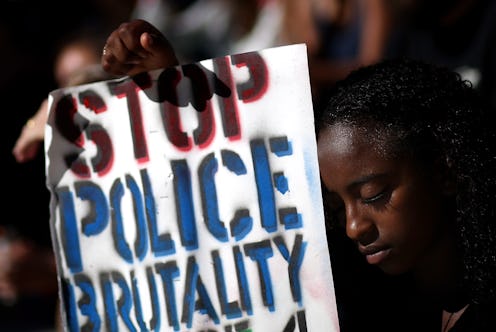News
What Happened To Jordan Edwards? The Black Teen Was Unarmed

It's happened yet again: an unarmed black teen named Jordan Edwards was fatally shot by a police officer on Saturday, and there are already inconsistencies with the police department's official account of what led to the tragedy. 15-year-old Edwards was in a vehicle leaving a Dallas house party on Saturday night with four others. Police investigating a noise and underage drinking complaint arrived at the scene, and minutes later, an officer shot Edwards in the head through the front passenger window as the car he was in drove away.
On Sunday, Balch Springs Police Chief Jonathan Haber claimed that the vehicle in which Edwards and the other teens were in had backed toward the officers "in an aggressive manner." He retracted his description of the events on Monday, stating that police video showed the opposite of what he'd originally claimed — the car had, in fact, been moving away from the officers, rather than toward them. "I'm saying after reviewing the video that I don't believe that it met our core values," Haber said of the officer's actions during a press conference.
The name of the policeman who shot Edwards has not been released to the public, but local news outlet WFAA reported that the officer in question is a six-year veteran of the Balch Springs police force, and he is currently on administrative leave. An investigation into the shooting is being conducted by the Dallas County Sheriff's Department.
The Edwards family and their attorney, Lee Merritt, held a news conference on Monday, demanding a change to policing and criticizing the police department's attempt to provide a justification for the shooting. Merrit said:
We are declaring war on bad policing. This has happened far too often. We are tired of making the same rhetorical demands, of having the same hashtags. Our community is fed up with the same tired excuses once again offered by Springs' police department yesterday — that this was somehow the fault of the victims, teenaged kids with no criminal records, with no motive to attempt to hurt anyone, with no evidence that they ever attempted to hurt anyone. To insinuate that there were some sort of bad acts on their part that could cause an officer to shoot multiple rounds into a vehicle occupied by five teenagers. There is no — there will be no justification, and this will not be a temporary stand on behalf of the community, this will not be a temporary stand on behalf of the family. We are demanding justice in this case and a change to policing in America. America, throughout the country, must figure out a way to police its citizens without killing them. It's not something unreasonable for this family to ask, it's not something unreasonable for the black community to ask. To simply police our communities, to respond to non-violent, non-life-threatening, mundane police calls without resort to brutal force, without the unnecessary loss of innocent life.
In a telephone interview with The New York Times, Merritt expressed approval of the police chief's decision to come forward and correct the details of his initial account, however he insisted the department take further action. "They have a dead child, they have the identity of the shooter, and they have no explanation for the shooting," he said. "They have more than sufficient probable cause to make an arrest."
Edwards has been described as "a good student who was very well liked by his teachers, coaches and his fellow students" by the Mesquite Independent School District; his football coach and teammates, classmates, and teachers have similarly painted a picture of Edwards as a friendly teen who never caused trouble and did well in school — he had a 3.5 GPA.
"We’ve heard excuses before in the past," Merritt said, referring to previous cases of police killings of unarmed black men. "You know why it happens, because the dads aren’t present. That excuse isn’t here. Or the kid was violent. That excuse isn’t present here."